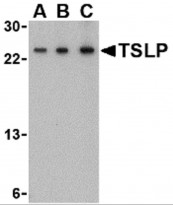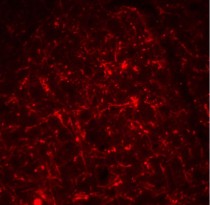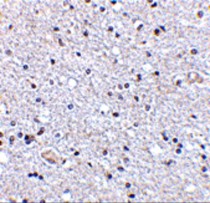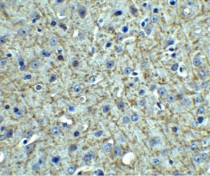ARG55638
anti-TSLP antibody
anti-TSLP antibody for ICC/IF,IHC-Formalin-fixed paraffin-embedded sections,Western blot and Human,Mouse
Overview
| Product Description | Rabbit Polyclonal antibody recognizes TSLP |
|---|---|
| Tested Reactivity | Hu, Ms |
| Tested Application | ICC/IF, IHC-P, WB |
| Host | Rabbit |
| Clonality | Polyclonal |
| Isotype | IgG |
| Target Name | TSLP |
| Antigen Species | Human |
| Immunogen | Synthetic peptide (19 aa) within aa. 40-90 of Human TSLP. |
| Conjugation | Un-conjugated |
| Alternate Names | Thymic stromal lymphopoietin |
Application Instructions
| Application Suggestion |
|
||||||||
|---|---|---|---|---|---|---|---|---|---|
| Application Note | * The dilutions indicate recommended starting dilutions and the optimal dilutions or concentrations should be determined by the scientist. | ||||||||
| Positive Control | A-20 Cell Lysate |
Properties
| Form | Liquid |
|---|---|
| Purification | Affinity purification with immunogen. |
| Buffer | PBS and 0.02% Sodium azide |
| Preservative | 0.02% Sodium azide |
| Concentration | 1 mg/ml |
| Storage Instruction | For continuous use, store undiluted antibody at 2-8°C for up to a week. For long-term storage, aliquot and store at -20°C or below. Storage in frost free freezers is not recommended. Avoid repeated freeze/thaw cycles. Suggest spin the vial prior to opening. The antibody solution should be gently mixed before use. |
| Note | For laboratory research only, not for drug, diagnostic or other use. |
Bioinformation
| Database Links | |
|---|---|
| Gene Symbol | TSLP |
| Gene Full Name | thymic stromal lymphopoietin |
| Background | This gene encodes a hemopoietic cytokine proposed to signal through a heterodimeric receptor complex composed of the thymic stromal lymphopoietin receptor and the IL-7R alpha chain. It mainly impacts myeloid cells and induces the release of T cell-attracting chemokines from monocytes and enhances the maturation of CD11c(+) dendritic cells. The protein promotes T helper type 2 (TH2) cell responses that are associated with immunity in various inflammatory diseases, including asthma, allergic inflammation and chronic obstructive pulmonary disease. The protein is therefore considered a potential therapeutic target for the treatment of such diseases. Alternative splicing of this gene results in multiple transcript variants. [provided by RefSeq, Jan 2012] |
| Function | Isoform 1: Cytokine that induces the release of T-cell-attracting chemokines from monocytes and, in particular, enhances the maturation of CD11c(+) dendritic cells. Can induce allergic inflammation by directly activating mast cells. Isoform 2: May act as an antimicrobial peptide in the oral cavity and on the skin. [UniProt] |
| Calculated MW | 18 kDa |
Images (4) Click the Picture to Zoom In
-
ARG55638 anti-TSLP antibody WB image
Western blot: A-20 cell lysate stained with ARG55638 anti-TSLP antibody at (A) 0.5, (B) 1 and (C) 2 µg/ml dilution.
-
ARG55638 anti-TSLP antibody ICC/IF image
Immunofluorescence: Mouse brain tissue stained with ARG55638 anti-TSLP antibody at 20 µg/ml.
-
ARG55638 anti-TSLP antibody IHC-P image
Immunohistochemistry: TSLP in Human brain tissue stained with ARG55638 anti-TSLP antibody at 2.5 µg/ml dilution.
-
ARG55638 anti-TSLP antibody IHC-P image
Immunohistochemistry: Mouse brain tissue stained with ARG55638 anti-TSLP antibody at 2.5 µg/ml.









